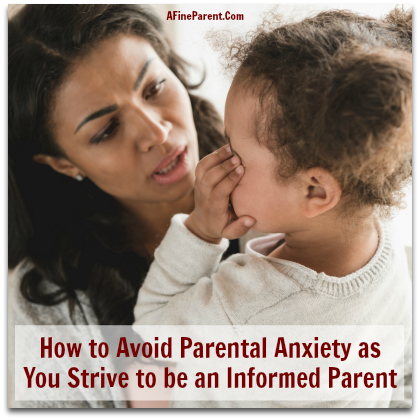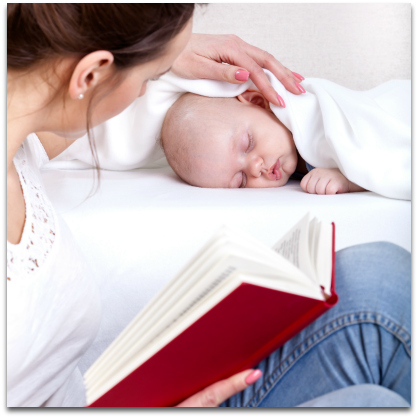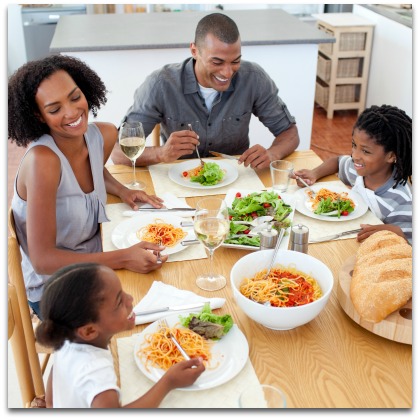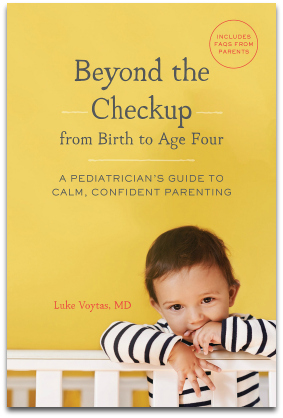 Our parents had it easy. They pretty much had two sources for making decisions about their kids – their own parents and maybe a tattered copy of Dr. Spock’s baby book.
Our parents had it easy. They pretty much had two sources for making decisions about their kids – their own parents and maybe a tattered copy of Dr. Spock’s baby book.
You and I, on the other hand, have access to all the material ever created on parenting at our fingertips.
We do research and worry about screen time, sugar, and our kids’ emotional development. We also have access to every opinion and judgment on social media, where our formerly chill friends can turn into aggressive parenting experts.
The result is a perfect recipe for anxious parents. As a pediatrician, it’s the most pervasive problem I see every day, and, as a parent, I struggle with it constantly too.
Good parents tend to be a bit anxious. They read books and gather opinions to help their kids be healthier, happier, and smarter in a world that seems to increasingly threaten those things. But being too anxious about our kids can get in the way of those goals.
It’s a big topic, but I want to explore a few areas where we can do practical things to reduce our anxiety. We’ll talk about how parental anxiety can create insecurities that companies are ready to exploit, for example. Then we’ll look at how it can turn the dinner table into a battleground three times a day and lead to long-term unhealthy eating habits. Finally, we’ll explore how anxiety can crush our own identities as individuals and transfer over to our kids.
Beware of Products That Prey on Your Anxiety!
 Parental anxiety is a big business. Companies know that you would do anything to help your kid. So you get bombarded with warnings and products that can make you feel insecure.
Parental anxiety is a big business. Companies know that you would do anything to help your kid. So you get bombarded with warnings and products that can make you feel insecure.
For babies, this messaging can be especially relentless. Lately, a lot of new parents have been asking me about smart baby monitors like The Owlet. These are pricey sensors that actually monitor your baby’s vital signs (such as heart rate and oxygen level), link up with your smartphone, and alert you if your baby is in trouble.
Every parent is terrified of SIDS – I’ve had parents admit to me that they take turns watching their kids sleep all night to make sure they’re okay! So the marketing for these gadgets uses phrases such as “peace of mind” and “you can never be too safe.”
These products haven’t been shown to save kids, and they certainly don’t decrease anxiety. Anyone who’s ever stayed overnight in a hospital knows that monitors give false alarms. A lot. They also imply that your baby is fragile, and that mindset threatens to color your interactions with your kid as she grows older. With every cold, you might wonder if she has pneumonia or an ear infection. So you rush her into the doctor for “peace of mind.” You might delay feeding her solid foods because she might choke, and “you can never be too safe.”
But I want to tell you that your baby is tough. She’s made to let you know what she needs at night, to power through most colds without much trouble, and to protect her own airway from choking. Be confident in your baby’s strength! Trust that you’ll learn to read her cues better than a gadget ever can.
These companies also know that good parents like us would do anything to build our kid’s brains, so they’re eager to help out with a variety of sleek electronic products to make them smarter.
The only problem is that they don’t work! A 2007 study looked at the effects of watching educational videos such as Baby Einstein in kids under age two and the results were shocking. For every hour kids spent watching the videos, they learned about six to eight fewer vocabulary words than kids who didn’t watch videos. They also scored about ten percent lower on language skill tests.
I think it makes parents a lot less anxious to know that they already have everything they need for their baby to thrive – your voice and your face. That’s it. Anything that replaces the time looking and listening to you isn’t a good tradeoff. Imagine you and your baby sitting in a white room with no windows, a chair, about 10,000 diapers, and an industrial incinerator for those diapers for the next year. You’d go crazy, but your baby would be thrilled.
As we’ll explore in the next section, to parent is to worry about your child’s nutrition, and big business is benevolent enough to save the day once again. When I think about toddler formula, my eye starts twitching. There’s nothing specifically wrong with toddler formula – it’s just that it’s expensive and your toddler in no way needs it. The manufacturers tout the “DHA for optimal brain development” and prebiotics for “immune support.” The packaging says, “You certainly don’t have to give this to your kid. . . . if you’re fine with just okay brain development.” Now there’s even “older toddler formula.” I’m sure that high school formula to boost your child’s SAT score isn’t far behind!
Speaking of your kid being in high school, you’ll still find plenty to worry about – and you have access to perhaps the most intense monitoring technology of all. Top phone tracker apps like mSpy and Spy Bubble don’t just tell you where your kid is, they tell you which apps they use, what they text, and who they call, all without your teen knowing. One app can even tell you the speed of any car he’s traveling in!
 I get it – phones create risks for our kids that we didn’t have back in the day. But spying on your kid isn’t going to give you peace of mind. It’s just going to drive you crazy, violate his privacy, and erode trust between both of you. Just imagine if your parents had been able to track everything you did at that age. NOT good.
I get it – phones create risks for our kids that we didn’t have back in the day. But spying on your kid isn’t going to give you peace of mind. It’s just going to drive you crazy, violate his privacy, and erode trust between both of you. Just imagine if your parents had been able to track everything you did at that age. NOT good.
The list of products that play upon your anxiety goes on and on – expensive amber necklaces for teething, “little genius” flashcards, bamboo-fiber wipes grown amongst baby pandas that nourish your child’s soul as they clean her poopy butt – it’s endless. So, when it comes to products that offer to help your kid, BE SKEPTICAL. Know that she’s not fragile and that you are the finest and least expensive educational gadget ever created.
Take Stress Off the (Dinner) Table
With my kids, it always seems like eating is a stressful time, whether it’s trying to choke down some cheesy bread on the way out the door to school or getting home late and trying to rush dinner just as the kids are doing their pre-bedtime wind up.
As parents, we have an instinct to make sure our kids eat enough (as a grandparent that instinct goes bonkers). You also want your kid to eat healthy.
But he’s smart. He’ll employ his delay tactics and smush around that vegetable lasagna as you work your playbook to get him to eat it. Finally, with bedtime rapidly approaching, you’ll look at your partner with exasperation and say, “Well he’s got to eat something.” You’ll then microwave some chicken nuggets which your kid accepts with a look of triumph. This scene plays out nightly in homes just like yours. For a lot of families, the kitchen becomes a battleground three times a day.
A simple change in philosophy can help keep stress away from the table. Here’s the key: Worry about what your child eats, never about how much he eats.
Kids know exactly how many calories they need, and they’re going to get them. They might eat drastically different amounts from day to day and meal to meal, but when you step back and look at what they eat over a few weeks, it’s remarkably consistent.
 Your child doesn’t have to eat something before he goes to bed. Kids like knowing the ground rules – if whining never gets him the nuggets, he’s going to eat the food you offer. If you start this tactic and he doesn’t eat, don’t panic! The tone shouldn’t be “Fine, if you don’t want it then you don’t get anything!” Just be matter-of-fact. You can leave the food for him to come back to later, and if he doesn’t eat he’ll be ready the next day as his body looks for calories.
Your child doesn’t have to eat something before he goes to bed. Kids like knowing the ground rules – if whining never gets him the nuggets, he’s going to eat the food you offer. If you start this tactic and he doesn’t eat, don’t panic! The tone shouldn’t be “Fine, if you don’t want it then you don’t get anything!” Just be matter-of-fact. You can leave the food for him to come back to later, and if he doesn’t eat he’ll be ready the next day as his body looks for calories.
I often encourage parents to do a silly little thought experiment – what if, for every meal over the next year, you gave your child a mushy bowl of porridge with the perfect ratio of veggies, good fats, and proteins? What would happen? Your child would fuss a lot the first few days, and not eat much, and then he’d come in to see me in a year and his growth chart would look perfect.
We also need to be aware of the anxiety-provoking baggage we bring to the dinner table each night. An interesting 2017 study explored this by looking at the families of 5-7-year-olds across multiple ethnic groups. When parents had even slight increases in stress earlier in the day, they were over forty percent more likely to pressure their kids to eat and less likely to serve their kids homemade foods. Other research has shown that when parents have more controlling styles during meals – either restricting food or forcing them to clean their plates – their kids are more likely to be overweight and to have unhealthier eating practices.
Breaking the Cycle of Anxiety Starts With You
One of the most concerning things about being anxious parents is how we transfer that anxiety to our kids. We often say anxiety is “genetic” because children of anxious parents are over five times more likely to have anxiety disorders than other kids. But a 2015 study of over 800 pairs of twins (great for teasing out genetic versus environmental factors) found that that anxiety is not hard-wired. Rather, it seems that anxious parents create an environment that tends to make their kids anxious as well.
One of the ways we pass on anxiety is by hyper-focusing on our kids, making them our projects at the expense of ourselves. Most of us would gladly sacrifice our social lives, fitness, sleep, even our marriages to some degree if it would make our kids happier, healthier, or smarter. (Isn’t that self-sacrifice philosophy what this whole parenting thing is about?)
But it doesn’t work that way! As our own identities get dulled we tend to become anxious guardians of our kids’ preciousness. You’re actually a pretty cool person, with interests and passions and a whole lot of experiences both good and bad. You don’t have to be a martyr. Your kid will do best when you take care of yourself and live a vibrant life, not when you collapse on her like a dying star and make her your entire world. Yes, working out or running might mean that you have a bit less time to spend with your kid. But when you feel better about yourself, your kid feels better about you too.
 I’ve caught myself judging other couples with young kids who sometimes go on weekend trips and date nights while my wife and I dutifully slog away in the trenches of parenthood. It feels like a badge of honor that shows we really love our kids. But kids whose parents have healthy affectionate marriages do better in all kinds of ways, so we shouldn’t feel guilty about taking time for ourselves.
I’ve caught myself judging other couples with young kids who sometimes go on weekend trips and date nights while my wife and I dutifully slog away in the trenches of parenthood. It feels like a badge of honor that shows we really love our kids. But kids whose parents have healthy affectionate marriages do better in all kinds of ways, so we shouldn’t feel guilty about taking time for ourselves.
I never thought I’d be a parent who hovered over my kid, but that’s always been my tendency – I think that’s one of the most insidious ways we transfer anxiety to our kids. Resilience or grit or whatever you want to call it has increasingly been identified as the most important trait in your child’s success, but it’s going to get awfully dull if you’re anxiously ready to fend off all hardships along the way. It’s tough to remember when she seems to be ignoring you for much of the day, but your kid is watching you always. If you’re constantly warning her how dangerous the world is, and if every scrape and tummy ache become a big concern, it’s no surprise that she’ll follow in your footsteps.
Perhaps most importantly, realize that your child is always watching how you handle your own stress and anxiety. The goal shouldn’t be to eliminate it, but rather to build a “stress tolerance,” reacting calmly and confidently to adversity and sharing what you could have done differently when you lose it.
Last week at the office I was talking to a normally reserved mom about some feeding problems her baby was having, when her toddler son ripped another page out of a magazine after lots of warnings. “WHAT IS YOUR PROBLEM?!” she yelled as she snatched him up from the floor and planted him in a chair. “DON’T MOVE!” Five seconds later she smiled sheepishly, put an arm around him and said, “I’m sorry, honey. I know it’s hard for you to sit there alone while we talk about your sister. I shouldn’t have gotten so angry.” Bravo.
If you feel like your anxiety is getting the better of you as you raise your kid, consider family therapy. Therapy might have a stigma, but it can be remarkably effective. A 2015 study examined the effects of a brief 8-week course of family therapy for families where at least one parent had anxiety. After a year, only 5% of the kids whose families had received therapy had significant anxiety, versus 31% in the control group which had not received therapy. That’s a big difference.
You’re a good parent because you care so much about your kid. But you’re an even better parent and a happier person when you’re calm and confident.
The 2-Minute Action Plan for Fine Parents
Do 2 things at the dinner table tonight:
- Before dinner, think about the most stressful things that happened to you today, let them go, and be thankful that you’re about to sit down with the people you care most about.
- Worry about what your child eats tonight, not how much he eats. Give him the food you want him to eat, keep your cool if he doesn’t eat it, and focus on sharing your day with each other rather than engaging in a food battle.
The Ongoing Action Plan for Fine Parents
- Write down two ways that your anxiety about your kid affects you in a negative way. Sleep deprivation? Lack of exercise? Sacrificing your marriage? Now write down something concrete you can do to make each problem better.
- Write down two ways that your anxiety about your kid affects your kid in a negative way. Is he afraid to take risks because you’re so cautious? Does he cry with the slightest injury because he reads the panic on your face? Now write down a habit or behavior of your own that you can change to make each problem better.
- When you’re thinking about buying any new product for your child, stop briefly and question whether that product plays on your anxiety about his well-being. Be skeptical about anything that promises to make your kid better in some way.
 This health and wellness handbook follows the typical checkup schedule from birth to age four with the goal of instilling calm and confidence in new or anxious parents.
This health and wellness handbook follows the typical checkup schedule from birth to age four with the goal of instilling calm and confidence in new or anxious parents.
With the tangle of information available on the internet, it’s easy for new parents to become overwhelmed. In this handbook, Dr. Luke Voytas, a practicing pediatrician (and father of two young kids), helps parents feel confident and calm by providing advice that is a blend of research-based information and common sense. Beginning with preparations leading up to baby’s birth, including how to find the right pediatrician, it follows the traditional checkup schedule—month by month, year by year—through age four. In a friendly, often humorous, and reassuring voice, he also delves into common illnesses and concerning topics including behavior, eating, and sleep, and provides answers to questions parents frequently ask. This handbook provides reliable information that empowers parents to make decisions that are best for their child and will surely be a trusted resource for everyday use.
Thank you for these important reminders that it’s okay to relax a little! I had postpartum anxiety after my eldest was born, and it was awful. Years later, that’s a distant memory, but I’m still prone to being overly cautious and worrying about my kids, and I remind myself frequently that doing so isn’t benefiting anyone.
The study about parents being more likely to pressure their kids to eat if they have had a stressful day themselves was particularly interesting. Sometimes we think we can leave our work day behind when we sit down at the dinner table with family, but that clearly isn’t the case!
Hi Katherine,
Thanks for your comment! Yeah, that study about our own stress leaking over into dinnertime is the one I think about the most too. I’ve always felt I could just rush in the door, sit down at the table, and be relaxed with my kids. But kids pick up on your body language and even how you talk when you’re stressed, so I’m trying to find ways to relax before dinnertime. It’s a work in progress!
Bravo.
very good. Thank you for sharing!………………………….